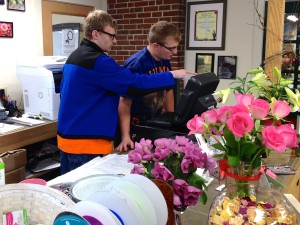
Necessity may be the mother of invention, but it can also be the father of innovation – at least when the father is Jim Lyman of Guilford, Connecticut. When Jim’s son, Eli, was a teen, he noticed a dearth of job opportunities for Eli and others who share his autism diagnosis. Unemployment is especially high among people with Autism; underemployment still higher.
Trends point to a larger economic problem: One in every 88 American children has been diagnosed with an Autism Spectrum Disorder (one in 54 boys) – a tenfold increase in prevalence over the last 40 years. The Spectrum encompasses complex developmental disabilities that affect a person’s ability to communicate and interact with others. In short, people with Autism represent an emerging labor force.
Jim also noticed a slump in the local agricultural economy. Farms were having trouble finding qualified workers to keep their businesses alive, and the Great Recession begun in 2008 was felling businesses large and small.
Tom Pinchbeck’s family had been growing flowers in Guilford for generations. The Pinchbeck Rose Farm was known as the place to go for the very best. Enter Jim Lyman with the idea of turning the farm into a social enterprise venture dedicated to addressing both problems. He got in touch with Ability Beyond Disability, a well-established nonprofit organization that had been serving Connecticut residents with disabilities since 1968. For the Pinchbecks and the local agricultural community, the farm would be reinvigorated as a vibrant horticultural hub. For young people with Autism, jobs and job training at the farm would offer a future of successful self-sufficiency.
Roses for Autism bloomed.
Today, Roses for Autism – a program of Ability Beyond Disability – employs 22 full-time and part-time workers in an inclusive environment, with 30 percent of the farm’s employees on the Autism spectrum. The Program offers assessments and vocational training for young people, age 16 and older, and for adults.
Arranging flowers, stemming roses and nurturing plants are practical horticultural jobs. Employees work in the largest heated greenhouse in the United States. But participants also gain skills behind-the-scenes with social media, information technology and order fulfillment.
“I feel I am treated as an equal here and receive the same respect as everyone else,” said Will, who has used the rose farm as a place to explore his interests in customer service, information technology and marketing.
“For a person with special needs, employment means more than a paycheck,” explained Danielle Capalbo, Grants Manager for Ability Beyond Disability. “It can be a lifeline – a way to make friends, participate in community events and gain confidence through independence.”
“We are proud to partner with The MENTOR Network’s Foundation to make this lifeline accessible,” she said.